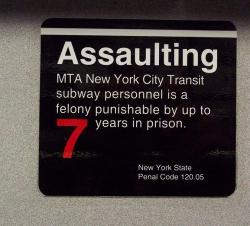 Felony offenses are seen as the more serious crimes in our justice system. A felony is any crime punishable by more than one year of imprisonment. If you are found guilty of a felony in the Federal system, you are housed in a federal prison. If you are found guilty of a felony charge in your state, you are housed in a State facility. The state facilities are usually run by your state’s Department of Corrections or by a private company with a Department of Corrections contract.
Felony offenses are seen as the more serious crimes in our justice system. A felony is any crime punishable by more than one year of imprisonment. If you are found guilty of a felony in the Federal system, you are housed in a federal prison. If you are found guilty of a felony charge in your state, you are housed in a State facility. The state facilities are usually run by your state’s Department of Corrections or by a private company with a Department of Corrections contract.
I'm a relatively respectable citizen. Multiple felon perhaps, but certainly not dangerous. – Hunter S. Thompson
Whether you are convicted of a felony in the State or the Federal system you will be labeled as a felon. Felons, by law, lose certain rights and privileges. They lose the right to vote and carry a firearm. They also have registration requirements in each state so that law enforcement officers can keep track of where felons live. Depending on the crime, there may be restrictions on where you can live or own property.
Felonies are very serious matters. A short summary of the history and classification of felony charges is listed below.
History of the Felony
 Under the English common law, a felony was a crime where the penalty for a conviction was the taking of your money and property. Since property was so important the loss of it changed the social status of the person. Landowners enjoyed certain rights and privileges not available to those who did not own land. Because of this felonies were thought of as the worst of criminal offenses.
Under the English common law, a felony was a crime where the penalty for a conviction was the taking of your money and property. Since property was so important the loss of it changed the social status of the person. Landowners enjoyed certain rights and privileges not available to those who did not own land. Because of this felonies were thought of as the worst of criminal offenses.
Under the old common law a person convicted of a felony did not only lose land rights or money. A person convicted of a felony could also be sentenced to death or to the have certain body parts removed. As time went on branding was used to identify those who had been convicted.
Long prison sentences were common under the English common law. Prisoners convicted of felonies who were not put to death were often locked away in dark solitary rooms for years at a time. They were often fed very poorly and they suffered from malnutrition and disease. Some were sentenced to perform hard labor.
In all cases under the old system a felony resulted in loss of life, liberty or property and a forfeiture of all rights and privileges that were enjoyed by the individual prior to his conviction.
Modern Day Felonies
The felonies of today are a modern version of the old English system. A felony is no longer defined as a crime where the punishment is the taking of land. Today a felony is defined as an offense that is punishable by more than one year of imprisonment.
In modern society a person can no longer be branded or have a body part removed if they are convicted of a felony. However, in some cases, such as in cases of criminal tax evasion or in drug trafficking cases, a person’s money or property may still be seized.
Just as the common law allowed for a penalty of death, in rare cases certain states still allow for a person to be put to death for their felony crime. This punishment is usually reserved for those who commit felonies such as murder or sexual assault.
Unlike the old English prisons, there are guidelines and restrictions as to how prisoners are to be treated. Prisoners housed in jails in the United States are entitled to food and proper medical care. Solitary confinement is limited to those who are considered extremely dangerous or as punishment for breaking prison rules. Even in those cases there are guidelines as to how long a person may be held in confinement.
 Prisoners are no longer ordered to perform dangerous physical tasks for the king. But many prisons do still have work programs where offenders perform manual labor. Unlike the old system, these tasks are designed to keep the offender busy and to teach them job skills that can be used upon release.
Prisoners are no longer ordered to perform dangerous physical tasks for the king. But many prisons do still have work programs where offenders perform manual labor. Unlike the old system, these tasks are designed to keep the offender busy and to teach them job skills that can be used upon release.
In all cases, both in the old common law and today, a person convicted of a felony does lose their civil rights. A convicted felon may not vote or own a firearm. If an offender is convicted of committing a crime against a child, there may also be restrictions on where the offender may live and own land. There is also a stigma associated with a felony conviction that can affect an offender’s life forever after release.
Types of Felonies
There are two types of felony charges. These are violent felonies and non-violent felonies.
Violent Felonies
These are felony chaarges which involve physical or psychological harm to an individual. Crimes that are considered violent felonies are
- Carjacking
- Arson
- Aggravated Assault or Aggravated Battery
- Murder
- Rape and Sexual Assault
- Crimes involving the use of Firearms or Explosives
- Burglary
- Robbery
These are the types of crimes that make people afraid or that hurt others. Violent felonies are the crimes that people typically associate with a felony offense or crime in general. If you are convicted of a violent crime, you face longer jail sentences and harsher punishments. There are also many restrictions that can be placed upon you if you are released on probation or parole. Offenders convicted of violent crimes usually face harsh stigmas and find it difficult to find jobs or housing when their sentences are completed.
Non-Violent Felonies
These are typically felony crimes against a person’s property or that are considered not to cause injury or psychological harm. Crimes that are considered non-violent are
- Possession or Sale of Drugs
- Felony Driving on a Suspended License
- Grand Theft
- Computer Crimes
- Embezzlement
- Trespass on a Construction Site
- Cattle or Livestock crimes
These crimes are still felonies. A person who is convicted of these crimes can still lose property and voting rights. But a conviction for one of these crimes does not carry the same penalty or stigma as that of a violent felony offense.
 Classification of Felonies
Classification of Felonies
Felonies have different classifications that govern the punishment that offenders can receive. The classifications vary. Different states have different categories and the federal system has its own classifications as well.
Degree Felony Classifications
- Capital
- Life
- First Degree
- Second Degree
- Third Degree
For states that have this type of system, Capital offenses are the worst crimes that are punishable by death. Followed by life felonies in which a person can receive a life sentence. The seriousness of the crime goes down as the numbers go up. So a first degree felony is the more serious crime, while the third degree felony would be a minor felony.
Alphabetical Felony Classifications
- Class A
- Class B
- Class C
- Class D
- Class E
- Class F
- Class G
- Class H
- Class I
The Federal Government uses this type of classification system. The exact punishments are set out in 18 USC § 3559 of the Federal code. Class A felonies are the worst offenses being punishable by death, where Class E offenses are the lease serious. There are no classifications of crime after a Class E in the federal system.
Some states use this classification as well. Certain states have a Class A felony as the worst offense with crime seriousness declining as you go through the alphabet. Other states just use the classification to identify the type of crime with no correlation as to the seriousness of the offense.
Numerical Felony Classifications
- Class 1
- Class 2
- Class 3
- Class 4
- Class 5
- Class 6
Most states that have this classification system stop at Class 4. A Class 1 felony is the worst and a Class 4 felony is the least serious. Some states continue and have Class 5 and Class 6 felonies which are seen as being incredibly minor. Class 5 and Class 6 felonies include crimes such as felony driving on a suspended license or felony petty theft.
No matter what type of felony you are charged with, a felony conviction has serious consequences. A conviction means loss of your right to vote, loss of firearm rights and some types of property. You should never proceed in the felony system without a competent attorney who can inform you of your rights and help you to protect them.




